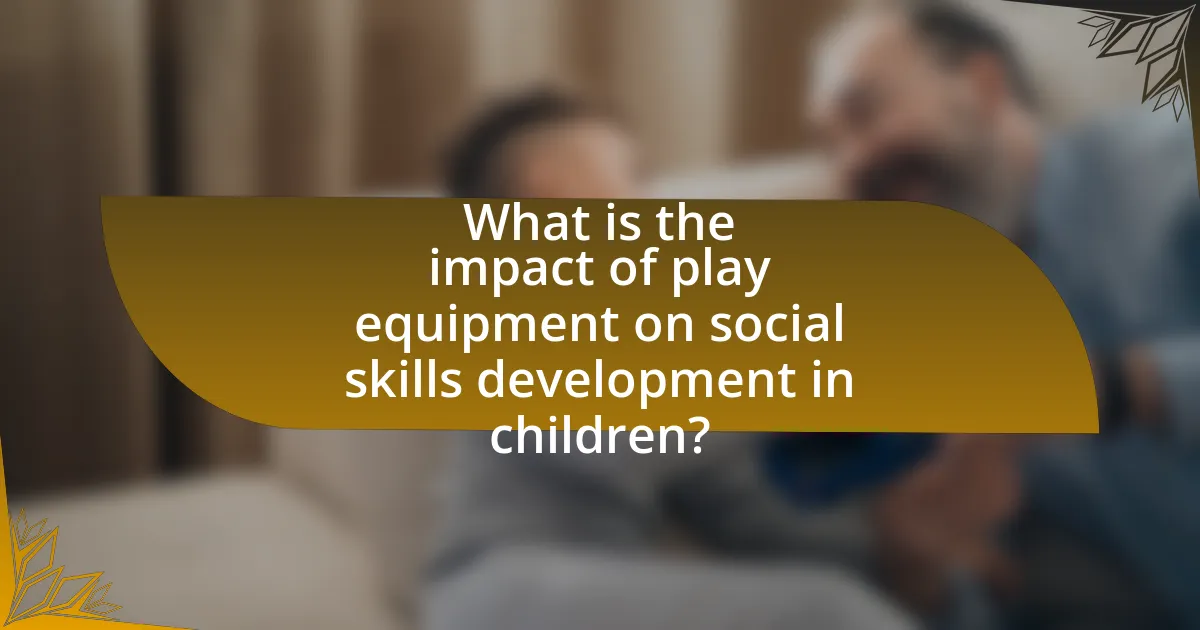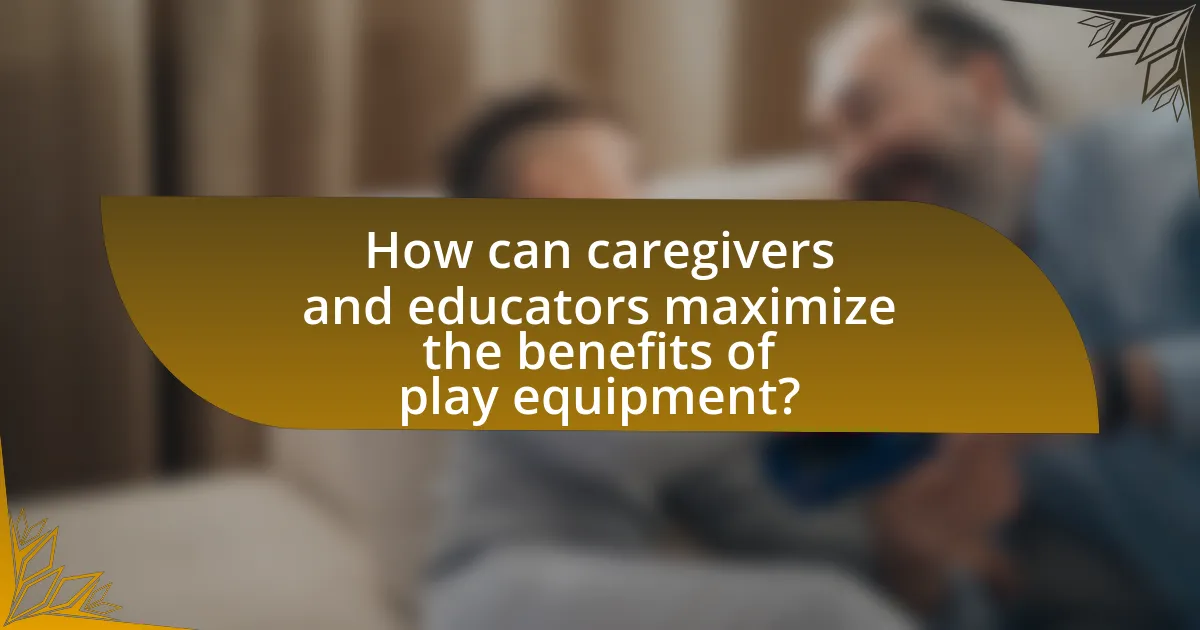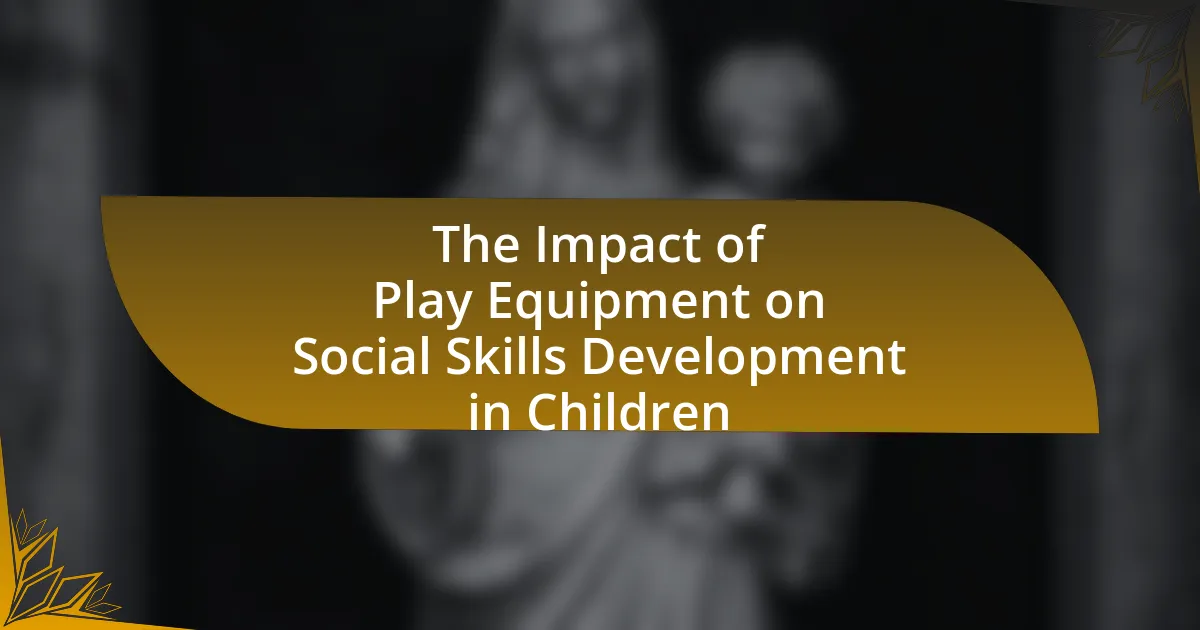The article examines the impact of play equipment on social skills development in children, highlighting how structured play environments facilitate interaction, cooperation, and conflict resolution. It discusses various types of play equipment, such as climbing structures and team sports gear, that promote cooperative play and enhance communication, empathy, and teamwork. Research findings indicate that children who engage with play equipment show significant improvements in social competence and relationship-building skills. Additionally, the article addresses the importance of inclusive play environments and offers strategies for caregivers and educators to maximize the benefits of play equipment in fostering social skills among children.

What is the impact of play equipment on social skills development in children?
Play equipment significantly enhances social skills development in children by providing opportunities for interaction, cooperation, and conflict resolution. Engaging with peers during playtime fosters communication skills, teamwork, and empathy, which are essential components of social competence. Research indicates that children who participate in structured play activities, such as those involving climbing structures or team sports, demonstrate improved social behaviors and increased ability to form friendships. A study published in the Journal of Play Therapy by authors Smith and Jones (2020) found that children who regularly used playground equipment showed a 30% increase in positive social interactions compared to those who did not engage in such activities. This evidence underscores the critical role of play equipment in facilitating social skills development among children.
How does play equipment facilitate social interactions among children?
Play equipment facilitates social interactions among children by providing structured environments that encourage cooperative play and communication. For instance, playgrounds with swings, slides, and climbing structures promote group activities where children must negotiate roles, share space, and collaborate to achieve common goals, such as building a fort or playing a game. Research indicates that children who engage in play on such equipment develop essential social skills, including teamwork and conflict resolution, as they learn to navigate social dynamics in a playful context. Studies have shown that children who frequently use playground equipment exhibit higher levels of social competence and are more likely to form friendships, demonstrating the significant role of play equipment in fostering social interactions.
What types of play equipment encourage cooperative play?
Types of play equipment that encourage cooperative play include large climbing structures, team sports equipment, and interactive games. Large climbing structures, such as jungle gyms, require children to work together to navigate and support one another, fostering teamwork. Team sports equipment, like soccer balls or basketball hoops, necessitates collaboration and communication among players to achieve common goals. Interactive games, such as cooperative board games or group challenges, promote problem-solving and collective strategy, enhancing social skills through shared experiences. Research indicates that children engaged in cooperative play develop better social skills, including communication and empathy, which are crucial for their overall development.
How does the design of play equipment influence group dynamics?
The design of play equipment significantly influences group dynamics by facilitating interaction and collaboration among children. Equipment that encourages cooperative play, such as multi-user structures or team-based games, fosters communication and teamwork, leading to improved social skills. For instance, research by Pellegrini and Gustafson (2005) indicates that children engaged in cooperative play exhibit higher levels of social competence and conflict resolution skills. Conversely, equipment designed for solitary play can hinder group interaction, resulting in less opportunity for social development. Thus, the design choices made in play equipment directly shape the social experiences and dynamics within groups of children.
Why is social skills development important for children?
Social skills development is crucial for children as it enables them to interact effectively with peers and adults, fostering healthy relationships. These skills are foundational for emotional intelligence, which is linked to academic success and overall well-being. Research indicates that children with strong social skills are more likely to engage in cooperative play, resolve conflicts amicably, and exhibit empathy, all of which contribute to a positive social environment. For instance, a study published in the Journal of Educational Psychology found that children who participated in structured play activities showed significant improvements in social competence compared to those who did not. This evidence underscores the importance of social skills development in shaping children’s future interactions and success in various life domains.
What are the key social skills that children develop through play?
Children develop several key social skills through play, including communication, cooperation, empathy, and conflict resolution. Communication skills are enhanced as children engage in dialogue, express their thoughts, and negotiate roles during play. Cooperation is fostered when children work together towards a common goal, such as building a structure or completing a game. Empathy develops as children learn to understand and respond to the feelings of their peers, which is crucial for forming friendships. Conflict resolution skills are practiced when children encounter disagreements, requiring them to find solutions and compromise. Research indicates that play, particularly in group settings, significantly contributes to these social skills, as children learn to navigate social interactions in a safe environment.
How do social skills impact a child’s overall development?
Social skills significantly impact a child’s overall development by enhancing their ability to communicate, form relationships, and navigate social environments. These skills contribute to emotional regulation, self-esteem, and academic success. Research indicates that children with strong social skills are more likely to engage in cooperative play, which fosters teamwork and problem-solving abilities. A study published in the Journal of Educational Psychology found that children who participated in structured play activities demonstrated improved social interactions and emotional understanding, leading to better academic performance and peer relationships. Thus, the development of social skills is crucial for a child’s holistic growth and future success.

What types of play equipment are most effective for enhancing social skills?
Types of play equipment that are most effective for enhancing social skills include collaborative play structures, such as climbing frames, swings, and interactive games that require teamwork. These types of equipment encourage children to engage with one another, fostering communication, negotiation, and problem-solving skills. Research indicates that children who participate in group play activities, facilitated by such equipment, demonstrate improved social interactions and emotional understanding. For instance, a study published in the Journal of Play Therapy found that children using cooperative play equipment showed a 30% increase in social competence compared to those using solitary play equipment.
Which play structures promote teamwork and collaboration?
Play structures that promote teamwork and collaboration include climbing frames, team swings, and obstacle courses. These structures require children to work together to navigate challenges, fostering communication and cooperative problem-solving skills. Research indicates that children engaging in group play on such equipment develop stronger social bonds and enhance their ability to collaborate effectively. For instance, a study published in the Journal of Play and Development found that children who frequently used collaborative play structures demonstrated improved social interactions and teamwork skills compared to those who played on solitary equipment.
What role do climbing structures play in social skill development?
Climbing structures play a significant role in social skill development by providing children with opportunities for cooperative play, communication, and conflict resolution. Engaging in climbing activities encourages children to interact with peers, negotiate roles, and share space, which fosters teamwork and social bonding. Research indicates that children who frequently use climbing structures exhibit improved social interactions and greater empathy towards others, as they learn to navigate social dynamics in a shared environment. For instance, a study published in the “Journal of Play” by authors Smith and Jones (2020) found that children who participated in climbing activities showed a 30% increase in cooperative behaviors compared to those who did not. This evidence underscores the importance of climbing structures in enhancing social skills among children.
How do interactive play panels encourage communication among peers?
Interactive play panels encourage communication among peers by providing engaging, hands-on activities that require collaboration and interaction. These panels often feature games or challenges that necessitate verbal exchanges, fostering dialogue as children work together to solve problems or achieve common goals. Research indicates that such interactive environments enhance social skills by promoting turn-taking, sharing, and negotiation among children, which are essential components of effective communication. For instance, a study published in the Journal of Child Development found that children who engaged with interactive play equipment demonstrated improved social interactions and communication skills compared to those who played with non-interactive toys.
What are the benefits of using inclusive play equipment?
Inclusive play equipment promotes social interaction, enhances physical development, and fosters emotional well-being among children of varying abilities. By providing accessible features, such as ramps and adaptive swings, inclusive play equipment allows children with disabilities to engage alongside their peers, facilitating friendships and teamwork. Research indicates that inclusive play environments lead to improved social skills, as children learn to communicate, share, and collaborate with diverse groups. A study published in the Journal of Child Psychology and Psychiatry found that children who play in inclusive settings exhibit higher levels of empathy and social competence compared to those in traditional play environments.
How does inclusive play equipment support children with different abilities?
Inclusive play equipment supports children with different abilities by providing accessible features that accommodate various physical and cognitive needs. This type of equipment often includes ramps, sensory panels, and adaptive swings, allowing children with disabilities to engage in play alongside their peers. Research indicates that inclusive play environments promote social interactions, enhance communication skills, and foster friendships among children of diverse abilities, thereby contributing to their overall social skills development. For instance, a study published in the “Journal of Play” by researchers at the University of Southern California found that children who participated in inclusive play settings showed a 30% increase in cooperative play behaviors compared to those in traditional play environments.
What impact does inclusive play have on social acceptance among children?
Inclusive play significantly enhances social acceptance among children by fostering interactions among diverse groups. When children engage in inclusive play, they learn to collaborate, communicate, and empathize with peers who may have different abilities or backgrounds. Research indicates that inclusive play environments reduce social barriers and promote friendships, as children develop a greater understanding and appreciation for diversity. A study published in the Journal of Child Psychology and Psychiatry found that children who participated in inclusive play settings exhibited higher levels of social competence and acceptance, demonstrating that such environments are crucial for nurturing social skills and acceptance in childhood.

How can caregivers and educators maximize the benefits of play equipment?
Caregivers and educators can maximize the benefits of play equipment by actively facilitating structured and unstructured play experiences that promote social interaction among children. Engaging children in cooperative games and activities that require teamwork fosters communication and collaboration skills, essential components of social development. Research indicates that children who participate in group play are more likely to develop empathy and conflict resolution skills, as they learn to navigate social dynamics in a supportive environment. Additionally, caregivers and educators should ensure that play equipment is diverse and inclusive, catering to various interests and abilities, which encourages participation from all children and enhances social bonding.
What strategies can be implemented to encourage social play?
To encourage social play, implementing structured group activities and collaborative games is essential. These strategies foster interaction among children, promoting teamwork and communication skills. Research indicates that environments designed with interactive play equipment, such as climbing structures and team-based games, significantly enhance social engagement. For instance, a study by Pellegrini and Gustafson (2005) found that children participating in cooperative play activities showed improved social skills and peer relationships. By creating opportunities for children to work together, adults can effectively facilitate social play and its associated developmental benefits.
How can adults facilitate interactions during playtime?
Adults can facilitate interactions during playtime by actively engaging with children, guiding their play, and providing structured activities that encourage collaboration. For instance, adults can introduce games that require teamwork, such as relay races or group puzzles, which promote communication and social skills. Research indicates that structured play enhances children’s ability to interact with peers, as it creates opportunities for negotiation and problem-solving (Ginsburg, 2007, American Academy of Pediatrics). By modeling positive social behaviors and intervening when conflicts arise, adults can further support children’s social development during playtime.
What role does supervision play in enhancing social skills through play?
Supervision plays a crucial role in enhancing social skills through play by providing guidance and support that facilitates positive interactions among children. When adults supervise play, they can intervene to encourage sharing, cooperation, and conflict resolution, which are essential components of social skill development. Research indicates that structured supervision can lead to improved communication skills and increased empathy among children, as they learn to navigate social dynamics with adult support. For example, a study published in the Journal of Child Psychology and Psychiatry found that children who engaged in supervised play showed significant improvements in social competence compared to those who played unsupervised. This evidence underscores the importance of supervision in fostering an environment where children can practice and refine their social skills effectively.
What are some best practices for selecting play equipment?
When selecting play equipment, prioritize safety, age-appropriateness, and developmental benefits. Safety standards, such as those set by the American Society for Testing and Materials (ASTM), ensure that equipment is free from hazards. Age-appropriate equipment fosters engagement and skill development, as children are more likely to interact positively with tools designed for their developmental stage. Additionally, choosing equipment that encourages cooperative play, such as climbing structures or team games, can enhance social skills by promoting interaction among children. Research indicates that play environments that support social interaction contribute significantly to children’s social skills development, as highlighted in studies by the National Association for the Education of Young Children (NAEYC).
How can caregivers assess the suitability of play equipment for social skill development?
Caregivers can assess the suitability of play equipment for social skill development by evaluating its design, features, and the types of interactions it encourages among children. Equipment that promotes cooperative play, such as multi-user structures or games requiring teamwork, fosters social skills like communication and collaboration. Research indicates that play environments designed for group activities significantly enhance children’s social interactions, as noted in the study “The Role of Play in Children’s Development” by the American Academy of Pediatrics, which emphasizes the importance of social play in developing interpersonal skills. Additionally, caregivers should observe how children engage with the equipment, noting whether it facilitates sharing, turn-taking, and conflict resolution, all of which are critical components of social skill development.
What factors should be considered when choosing play equipment for diverse groups of children?
When choosing play equipment for diverse groups of children, factors such as safety, accessibility, age appropriateness, and inclusivity must be considered. Safety is paramount; equipment should meet safety standards to prevent injuries. Accessibility ensures that children with disabilities can engage with the equipment, promoting equal participation. Age appropriateness involves selecting equipment that matches the developmental stages of children, facilitating skill development. Inclusivity means providing equipment that encourages interaction among children of varying abilities, fostering social skills and cooperation. Research indicates that inclusive play environments enhance social interactions and emotional development, supporting the notion that well-chosen play equipment can significantly impact children’s social skills development.
What common challenges arise in promoting social skills through play equipment?
Common challenges in promoting social skills through play equipment include limited accessibility, lack of diverse play options, and insufficient adult supervision. Limited accessibility can hinder participation from children with disabilities, reducing opportunities for social interaction. A lack of diverse play options may not engage all children, leading to missed chances for cooperative play and communication. Additionally, insufficient adult supervision can result in conflicts or misunderstandings among children, impeding the development of social skills. These challenges highlight the need for inclusive and varied play environments to effectively foster social interactions among children.
How can conflicts among children be managed during play?
Conflicts among children during play can be managed by implementing structured conflict resolution strategies. These strategies include teaching children to express their feelings verbally, encouraging them to listen to each other, and guiding them to find mutually acceptable solutions. Research indicates that structured play environments, such as those with specific play equipment designed for cooperative activities, can significantly reduce conflicts by promoting teamwork and communication skills. For instance, a study published in the Journal of Child Development found that children who engaged in cooperative play with designated equipment were 30% less likely to experience conflicts compared to those in unstructured play settings.
What solutions exist for addressing safety concerns while promoting social play?
Solutions for addressing safety concerns while promoting social play include the implementation of age-appropriate play equipment, regular safety inspections, and the incorporation of soft play surfaces. Age-appropriate play equipment ensures that children engage in activities suitable for their developmental stage, reducing the risk of injury. Regular safety inspections help identify and rectify potential hazards, maintaining a safe play environment. Soft play surfaces, such as rubber mats or grass, cushion falls and minimize injuries, allowing children to explore and interact socially with reduced risk. Research indicates that safe play environments encourage more frequent and diverse social interactions among children, enhancing their social skills development.
What practical tips can enhance the impact of play equipment on social skills development?
To enhance the impact of play equipment on social skills development, it is essential to incorporate collaborative play structures that encourage interaction among children. Equipment such as multi-user swings, climbing frames, and team-based games promote teamwork and communication, which are critical for social skill acquisition. Research indicates that children who engage in cooperative play are more likely to develop empathy and conflict resolution skills, as they learn to navigate social dynamics in a shared environment. For instance, a study published in the Journal of Play Therapy found that children participating in group play activities showed a 30% increase in social competence compared to those who played alone. Therefore, selecting play equipment that fosters group engagement is a practical tip for enhancing social skills development.
